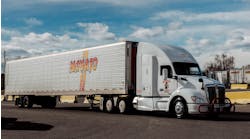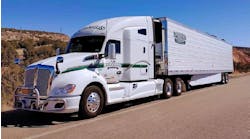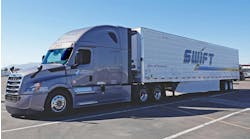FFE Transportation Services combines creative thinking with technology to drive continual improvement and efficiencies
Frozen Food Express Industries is one of the largest trucking companies in North America. A publicly owned motor carrier based in Dallas, Texas, it specializes in total temperature-controlled transportation services throughout the US, Mexico, and Canada; including line-haul less-than-truckload (LTL), truckload (TL), and intermodal.
The company also handles dry truckload freight, carries out dedicated hauling, and provides brokerage and logistics services. Revenue from all its business was more than $452 million in 2007.
The enterprise, which has various strategically placed LTL terminals and three TL terminals, is comprised of several subsidiaries: FFE Transportation Services - the primary operating subsidiary, American Eagle Lines, Lisa Motor Lines, and FFE Logistics. It operates a fleet of more than 2,000 power units - 1600 company trucks and 400 owner operators, and 4,300 trailers that include refrigerated and dry.
“The company has managed to be successful over its long history because it has always viewed itself as a service company that just happens to use trucks as one of the tools to deliver service,” states Russell Stubbs, FFE Transportation Services' senior vice-president and chief operating officer.
“As we grew, we got real good at picking up and delivering freight, but a lot of people were good at that,” he says. “We needed to keep figuring out how to do more things to take care of our customers with the assets we have.”
Intermodal
Recently, FFE Transportation Services has built up its intermodal refrigerated operation to the point that “there aren't many refrigerated carriers as big into intermodal as we are,” says John Hickerson, the company's senior vice-president and chief marketing officer. It had been involved with intermodal for years, but only as a last-minute solution to moving freight, normally during peak times when tractors weren't available.
Intermodal is now viewed as a valid and viable alternative for additional capacity for some customers, for certain markets, and for certain types of products - typically those where the refrigeration unit can run on start/stop mode, rather than running the whole time.
“Primarily, we're using expedited intermodal trains for loads going from the East Coast to the West Coast, the East Coast to the Midwest, the Midwest to the West Coast, and the Midwest to Texas,” Hickerson says. It is working with the FEC, Norfolk Southern, CSX, and BNSF railroads.”
Trailers for intermodal operation are specified for greater durability and are equipped with larger fuel tanks.
Logistics
“While into logistics for some time, it wasn't until this past January that greater efforts were devoted to this part of the business,” says Stubbs. “About half way through '06, after we had a great year in '05, our own limitation at the time was truck drivers. We couldn't grow because we couldn't get drivers.
“The challenge was to figure out how to gain more revenue with less dependence on truck drivers. We decided to buy more trailers, do more intermodal, beef up our logistics company, and move more loads with other people's assets.”
As it turned out, “the timing for a large scale launch into the logistics arena was less than ideal,” admits Hickerson. “Truck capacity became so available that shippers didn't really need brokers and logisticians to help them find capacity.
“We're gaining some traction now. We're going to stay in the business, build density at our current locations, and expand as it makes sense in the future as the market changes.”
Analysis
Company management regularly conducts a SWOT analysis, wherein it evaluates its strengths, weaknesses, opportunities, and threats. By focusing on these things, managers are able to better plan business strategies.
“We're continually looking for ways to leverage our assets, control expenses, gain operational efficiencies, and do more with less,” Stubbs clarifies.
Last year, the company consolidated its truckload operation. This past August, it merged in American Eagle's dry TL operation.
“We had empties crossing in the night continually because there was no overall visibility to an FFE truck going this way and an American Eagle rig going that way,” explains Hickerson. “We combined the two operations to complement each other and gain some back room synergy and cost-savings in managing them more jointly versus independently.”
Drivers
FFE Transportation Services has about 2400 drivers and contractors, which includes training teams and a few driving teams. “It's hard enough to find one driver, much less two,” comments Stubbs. “And in order to pay team driver wages, you really have to have a truck that never stops, and most of the freight we handle is not really conducive to that.”
The company recently began a new approach to taking on drivers and owner operators.
“It's no longer about simply recruiting,” notes Sherry Bass, vice-president of capacity development. “It goes way beyond that to building our own capacity by developing our drivers into truck lease or purchase plans, and having them become owner operators.” There's also the matter of bringing onboard owner operators.
A little more than a year ago, Bass began revamping the company's recruiting methods, seeking improvements in productivity. As part of the overhaul, she started using Tenstreet trucking industry software, which has a software suite designed to make the hiring process more efficient and effective.
“This lets us make an offer to the best applicants more quickly,” she says. “That is important because the good drivers and owner operators don't stay on the market very long.”
Recruiting is “very transactional and process oriented,” Bass goes on. “Tenstreet has one of the few pieces of software available today that incorporates some of the basics of process management, allowing us to measure as we go along, and make for accountability, which definitely improves our efficiency.”
Another change she has made is to the driver orientation process. “We've tried to make it as smooth and easy as possible by removing as many irritants as can be. We want the experience for our new hires to be pleasant and positive. This helps them get off on the right foot.”
Culture
A change in company culture came about in May 2006 when long-time Frozen Food Express Industries chief operating officer Charles Robertson retired, and Russell Stubbs was named his successor. Stubbs had been president of Lisa Motor Lines for about 10 years at the time.
Hickerson came on board in January 2007 after many years at the Con-way group of companies and the BNSF Railway.
“We began building a new management team and structure,” recalls Stubbs. “John and I were the new breed, bringing new ideas into the operation to act as change agents to improve things.”
Concurrently, there began a greater emphasis on using software and technology to help drive additional improvement and efficiencies.
Hickerson says the company recently purchased, and is implementing on a system-wide basis, an optimizer system for the LTL network to improve freight flow, service efficiency, and cost.
In addition, the company has purchased a costing optimization model to help it “better understand overall costs pricing in the very difficult task of accurately pricing LTL temperature-controlled freight.”
Around mid-year, the company started using SkyBitz GLS Trailer Tracking to help with real-time asset utilization and efficiency management for more control and visibility. SkyBitz is a two-way satellite-based communications system that doesn't require use of an embedded GPS chipset.
Customers
Along with putting into place new tools, “we've gotten back to the customer basics,” notes Hickerson. “We had forgotten about them, so Russell and I got on the road and personally visited the majority of our customers, past and present.
“We then reinforced with our operations folks at all levels that we were going to deliver on what we committed to. The entire team got on board and we really cleaned up our service product.
“As a result, we began giving a very pristine service product for which we were able to price as a higher end offering.”
Hickerson and Stubbs also personally visited every terminal in the FFE system from the third quarter of 2007 to second quarter of 2008.
“If you really want to find out how your company is doing, talk to your people and your customers,” Stubbs says. “We learned a lot, and that helped us make more changes. It's all been sort of a master reorganization, and this has taken us back into the profitability.”
Counsel
Growing out of all the visits was the creation of a customer advisory board, composed of 10 key customers.
“We share with them how we are doing financially, what our future looks like, and what our goals are,” explains Stubbs. “We also share our vision, and ask them if we're headed in the right direction.
“We ask them what are their needs right now that we're not fulfilling, and what our competitors are doing that we need to be doing, and then take every measure possible to ensure that what they need is what we're offering.”
“We don't want to make any assumptions about what we need to do,” Stubbs continues. “We want to hear it from the marketplace.”
Another element to the customer advisory board is educating the customer members on critical industry matters by bringing in industry experts to visit with them. “This empowers the customers to go back to their senior management and share what they learned,” says Hickerson. “It's a gift to them to take back something that they benefit from.
“We believe it is our job to make our customers be successful in their business and in their careers, and this connection helps create stronger loyalty.”
Vehicles
The majority of the company's tractors are Freightliner. There are also a number of Volvo and International tractors in the fleet.
All tractors, which are assigned, are specified for maximum optimization. The Freightliners have Detroit Diesel engines; the Volvo's and International's have Cummins power.
The lifecycle for tractors is 42 months, about 500,000 miles, because “we want to keep them in warranty,” says Stubbs. Refrigerated trailers are kept for seven years; dry vans for 10 years.
The majority of the fleet's refrigerated trailers are 53-foot Wabash National models. There are some Utility and Great Dane trailers as well.
The latest purchases of refrigeration units have been Carrier Transicold's X2 Series, which feature improved performance, easier serviceability, and enhanced sound quality.
As part of the efforts to better manage fuel costs, the company has invested in idle reduction technologies and tire pressure management, and is modifying equipment specifications to ensure the most aerodynamic fleet possible. In May, the maximum speed of company-owned tractors was reduced from 65 to 62 mph.
All these measures are being done across all company subsidiaries.
Enterprise-wise, all company trucks are equipped with some type of anti-idling device, mostly opti-idle. Stubbs says that some trucks have an APU system that prevents the engine from idling more than a set time.
FFE Transportation Services joined the SmartWay Transport Partnership in 2005 “because we thought it was the right thing to do as part of our being a good corporate citizen,” Stubbs says. SmartWay is a voluntary partnership between the government and freight shippers, carriers, and logistics companies for improving fuel efficiency and reducing environmental impacts from freight transport.
LTL
“We have the largest, and probably the only nationwide LTL offering in the temperature-controlled arena,” says Hickerson. “We will haul any size shipment basically to anywhere. We have dedicated schedules.
“What's really unique about the operation is that we can flex our LTL network by using our truckload fleet to supplement, especially toward the end of the week. About 40% of our LTL business moves on Thursday and Friday.”
Hickerson says the company is “in the process of reengineering our LTL network using an optimizer tool to help us not only become more efficient, but to give our customers a better and expanded service offering.”
Stubbs, who grew up in the business, doesn't anticipate the economy to improve in the near future, but he does expect the company to continue to improve through new ideas and initiatives for handling change, lowering costs, and increasing efficiencies to keep the 60-plus year old company moving forward.
History
The company grew out of a Dallas, Texas, business that sold used military equipment and trucks. It was begun by Cy Weller in 1946 after a stint in the US Army.
Recognizing that there was a lack of refrigerated trucks to transport perishable goods over long distances, Weller began purchasing Army refrigerators that were used for international shipment of food, and installing the units into trailers.
Around this time, Weller got to know Roger Malone who had started a trucking company called Frozen Food Express Industries. When Malone decided to exit the trucking business, Weller took over the company.
As the business grew, Weller brought in his brother Edgar and brother-in-law Stoney Stubbs. By December of 1960, Stoney was at the helm. It became a publicly traded company in 1971.
When Stoney retired in the late 1970s, his son, Stoney “Mit” Stubbs Jr, who joined the company in 1960, became president and chief executive officer in 1979.
Mit's son Russell went to work for Frozen Food Express in 1986 as a management trainee. Two years later, FFE bought Lisa Motor Lines, a refrigerated truckload company of around 80 trucks, and Russell was transferred to Fort Worth to run the operation.
In 1999, Russell was promoted to president of Lisa Motor Lines, which at that time encompassed around 400 trucks.
Frozen Food Express purchased Middleton Transportation in 1989 and Great Western Express in 1993, both refrigerated carriers, and merged them into the Lisa Motor Lines operation. American Eagle Lines was acquired in 1988.


